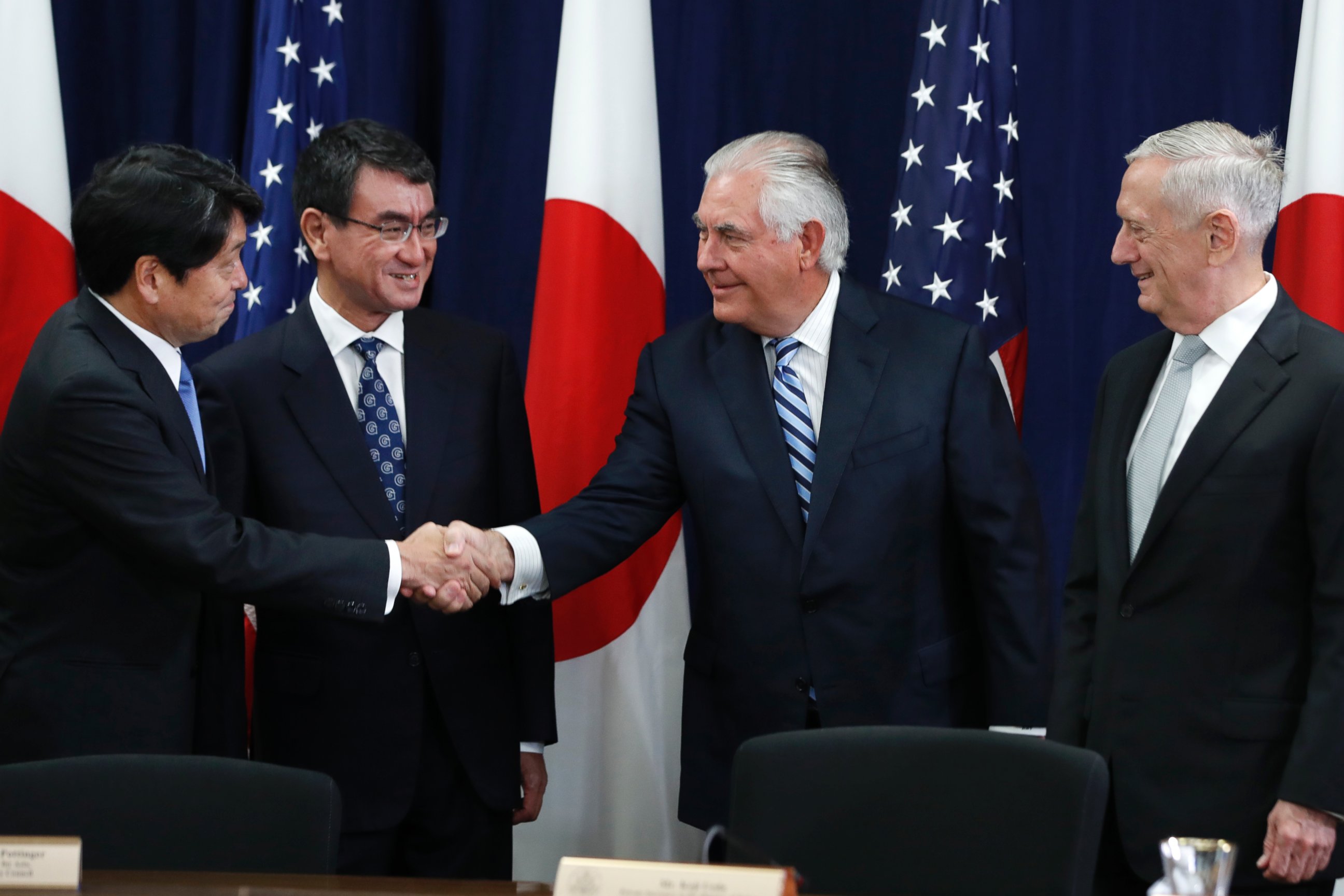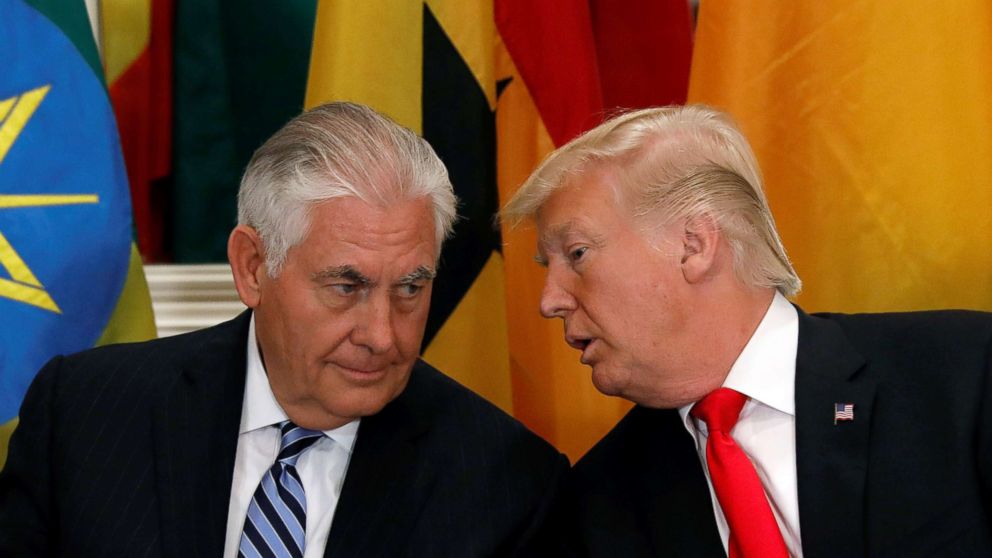Trump, Tillerson have sharp differences on policy despite denials
— -- Secretary of State Rex Tillerson, the nation's normally press-shy top diplomat, came out before cameras to deny one "erroneously reported" story that "continues to be misreported."
"The vice president has never had to persuade me to remain as secretary of state, because I have never considered leaving this post," he said, denying one rumor -- that he had to be talked out of quitting.
"I'm not going to deal with petty stuff like that," he said, not entirely denying another -- that he called President Donald Trump a "moron."
But while Tillerson pledged his loyalty and presented a united front for the Trump administration, it's no secret that he and his boss have had strong disagreements on a number of top issues.
Those debates, at times fierce, have been about policy positions, according to State Department officials, not personalities. Tillerson himself admitted as much, telling reporters in August, "He and I have differences of views on things like JCPOA and how we should use it ... but I think if we’re not having those differences, I’m not sure I’m serving him."
A senior State Department official reiterated that on Wednesday, telling ABC News that Tillerson is "forceful in his positions because he knows what he wants, he knows his stuff, so he's going to forcefully advocate for policy positions, but being forceful on policy positions doesn't mean you're going to talk to people that way."
Iran nuclear deal
The JCPOA, or Joint Comprehensive Plan of Action, as the Iran nuclear deal is formally known, is just one of those disagreements.
Tillerson has advocated for staying in the agreement and addressing Iran's "malign activity" elsewhere in the region through other means. But Trump has blasted the deal and said that he would go against Tillerson's advice and decertify Iran's compliance with the accord.
"If it was up to me, I would have had them non-compliant 180 days ago," Trump told the Wall Street Journal in July.
Tillerson has hedged from that initial position in more recent weeks, describing the deal as "incomplete" and telling reporters Wednesday, "We’re going to give him a couple of options of how to move forward to advance the important policy towards Iran."
North Korea
Since day one, Tillerson has taken the lead for the administration on North Korea, pushing for a campaign of what he calls "peaceful pressure" to drive North Korea to the negotiating table and have it relinquish its nuclear weapons program. That strategy requires China's cooperation in particular, securing North Korea's biggest trading partner's help in changing Kim Jong Un's calculus.
But repeatedly, Trump has carried a different message, especially on Twitter.
In June, Trump tweeted that he was giving up on China, writing, "While I greatly appreciate the efforts of President Xi & China to help with North Korea, it has not worked out. At least I know China tried!"

Both Tillerson and Defense Secretary Jim Mattis were forced into clean-up.
"China continues to work these issues," said Mattis the next day.
"They have a diplomatic responsibility to assert much greater economic and diplomatic pressure on the regime," added Tillerson.
Last weekend, after Tillerson publicly revealed that the U.S. does have open lines of communication with North Korea, Trump shot down the idea of talks -- calling them a "waste of time" and telling Tillerson to "save your energy."
The State Department reiterated that talks still remain the ultimate goal, although critics question whether North Korea would believe the U.S. is negotiating in good faith given the mixed messages.
Gulf crisis
Another critical issue that disclosed the divide between the two men was the Gulf crisis -- an ongoing diplomatic dispute between U.S. allies Qatar and a bloc led by Saudi Arabia and the United Arab Emirates. The group of countries cut off diplomatic ties and border and air crossings with Qatar, accusing it of having ties to terror groups -- something the small, but rich, nation denies.
Tillerson again had the lead on the issue, calling for calm and ordering both sides to make concessions and find compromise. But hours after a rare public statement from Tillerson, where he even accused the Saudi-bloc's "blockade" of hindering U.S. military efforts against ISIS, Trump took a different tact, effectively siding with Saudi Arabia and seeming to take credit for the blockade itself.
"Nations spoke to me about confronting Qatar over its behavior. So we had a decision to make," Trump said from the Rose Garden in June. "We have to stop the funding of terrorism. I decided along with Secretary of State Rex Tillerson, our great generals and military people, the time had come to call on Qatar to end its funding."
The White House and State Department both claimed the administration was unified in its concern about all nations doing enough to confront terrorism, even though the president only called out Qatar specifically.
Last month, Trump quipped that he would be willing to mediate the dispute while meeting with the emir of Kuwait -- the country that Tillerson has consistently said is mediating -- not the U.S. The rift remains open, with no solution in sight.
Charlottesville
The most personal of their differences was an understated rebuke of Trump by the carefully spoken Tillerson.
Amid the uproar over Trump's comments about the protests in Charlottesville, Virginia, Tillerson was asked during a Sunday show interview how the world would doubt America and its values after the comments.
"I don't believe anyone doubts the American people's values or the commitment of the American government or the government's agencies to living those values and defending those values," Tillerson said.
"And the president's values?" Fox News's Chris Wallace asked.
"The president speaks for himself," Tillerson said.
The moment stunned many and reportedly infuriated the president -- although Tillerson remains in his role still.




